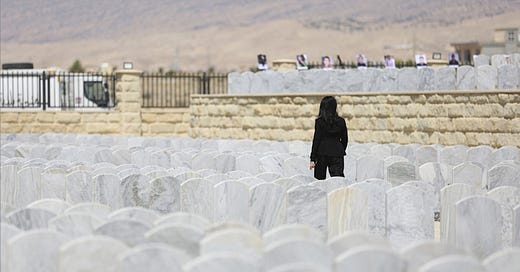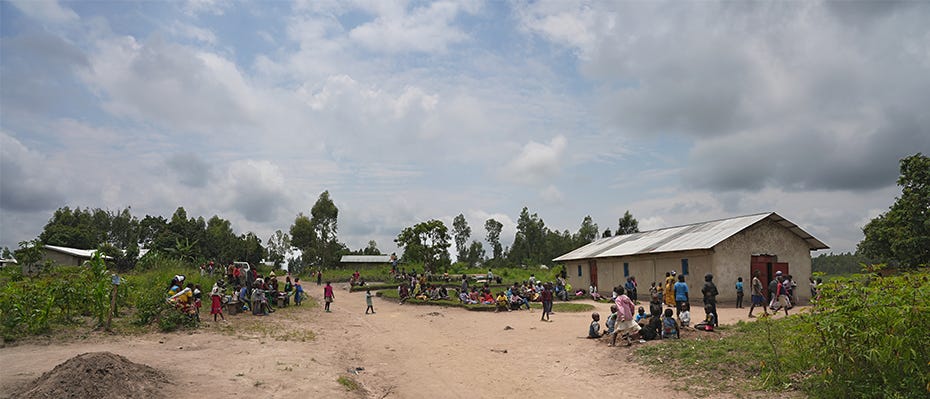ISIS is Back & Murdering, GOP/Dems Have Flip Flopped on Russia A LOT Since 2012, U.S. in the Business of Bitcoin, Former Chicago Mayor Staging a Comeback? (The Five for 03/03/25)
Hey, welcome to The Five, a publication about the stories that matter.
Quick note about my day job…if you’re a business or brand who needs to increase email open rates, social media reach and message “stickiness,” I’m here to help. The average email campaign open rate is 17%-28%, but The Five has more than doubled that for nearly a half decade, and so have emails for my clients in education, agriculture (Bayer, Syngenta), consumer package goods (Skittles, Pampers, Frozen Vegetables), pet food and more.
Ready to grow despite an unstable economy? Email seth@manx.solutions and we can set up a 15 minute call to increase your profitability, or click the button below to contact me.
With that being said, let’s dive into the news.
[one]
Well, the Islamic State/ISIS is back and murdering on multiple continents, and Americans don’t seem to a damn, perhaps because the media won’t report on it…or, perhaps because Christians in Congo and non-Muslim Arab minorities in the Middle East aren’t “trendy” victims to people who wave Palestine flags.
Up first, ISIS allegedly carries out a mass-beheading of an entire church in Congo.
The 70 decapitated bodies were discovered in a Protestant church in the town of Kasanga, in the Lubero Territory in the province of North Kivu toward the end of last week, according to Open Doors.
No group has taken responsibility for the atrocity, but Open Doors, and several other organizations, have accused the AFD of the murders, citing "field sources." The victims are believed to have been taken hostage a few days before they were killed.
Military administrator Alain Kiwewa for the Lubero Territory said he was investigating the incident, Pan-African news agency Agence de Presse Africaine reported.
"Local sources suspect the Allied Democratic Forces (ADF), an Islamist group of Ugandan origin affiliated with the Islamic State, as well as local armed groups of being responsible for the massacre. These groups have maintained a climate of terror in the region for several months," the agency said.
It said the victims, who had been "tied up and decapitated with knives," had been kidnapped on February 12.
Meanwhile in Iraq, the persecution of the minority Yazidi people (who hold to a monotheistic belief system that has nothing to do with Judaism, Christianity or Islam) could be ramping up again as Iraq may let ISIS murderers out of prison, as the Yazidi are still trying to sort out the last genocide, which is now a decade old.
The scars of the Yazidi genocide were reopened on Friday as the remains of 32 Yazidi victims murdered by ISIS were returned to their families in a somber ceremony in Sinjar.
The long and painful process of identifying and repatriating the remains of those massacred continues, highlighting ongoing grievances over the lack of justice and support for the Yazidi community.
A Decade of Unanswered Grief
Among the mourners was Ikhlas, a survivor of ISIS captivity who received the remains of her two brothers and father.
Overwhelmed with sorrow, she told Kurdistan24, “The genocide against Yazidis seems to have no end, and it won’t end. We still don’t know when the other mass graves will be excavated so that we can find some closure in knowing the fate of our loved ones.”
For over ten years, Yazidi families have endured the agony of waiting for news about their missing relatives.
Despite some progress in identifying remains through DNA testing, bureaucratic delays and a lack of resources have slowed the process significantly.
The return of remains on Friday marks the seventh round of repatriation efforts, bringing the total number of recovered victims to 275, while more than 300 bodies remain in Baghdad awaiting identification.
Challenges in Identifying Mass Grave Victims
The excavation of mass graves has been ongoing for the past three years, but only a fraction of the victims’ identities have been confirmed. Dr. Yasamin Munzer, head of the Mass Graves Department, cited several challenges: “The testing process is difficult due to the limited number of testing units. Many families were killed in Sinjar, leaving no relatives to compare DNA with. Additionally, some of the victims’ families are abroad, and we have collected DNA samples from them through our teams in Germany. After Ramadan, we plan to conduct another round of tests in Germany.”
Currently, 93 mass graves have been identified, with 55 excavated and 38 still untouched. Of the 750 bodies exhumed, 508 remain unidentified, while 242 have been confirmed and returned to their families.
Concerns Over the General Amnesty Bill
The passage of Iraq’s General Amnesty Bill has raised fears among Yazidis that it could lead to the release of individuals implicated in mass killings and crimes against their community.
Khalil stressed the importance of excluding ISIS members and their supporters from any form of amnesty: “It is the right of Yazidis and all Iraqis to reject this bill, as it could allow barbaric ISIS criminals, their families, and those who supported them to be released.”
However, he noted that the Federal Supreme Court has reassured Yazidi leaders that genocide perpetrators will not be included under the law.
[two]
The divide between reality and the skewed views of celebrities…might have closed just a little bit this weekend. At the Oscars last night (I refuse to watch awards shows), the best actress hardware went to Mikey Madison, who’s best known for a role in Tarentino’s Once Upon a Time in Hollywood. Apparently her film, Anora (I had never heard of it, and I write about pop culture) is about prostitution or something?
A quick Wikipedia search reveals that Madison grew up in the affluent San Fernando Valley region of the LA Metro to two advanced-degreed professional parents. Something tells me that she didn’t bother to visit drug-addicted corner prostitutes in Oakland before forming her opinion on the “sex worker community.”
Well, let’s check in on what that “community” faces:
45–75% of sex workers experience sexual violence on the job globally
74% of women in prostitution have experienced violence from men who buy sex
Women in prostitution are 18 times more likely to be murdered than the general female population
Under-reporting of crimes to the police is common
Even when cases are reported, sex workers often experience discrimination and mixed responses from police officers
Contextual factors, such as unsafe working conditions, are linked to violence against sex workers
Marginalization of sex workers can leave them vulnerable to victimization
While a vast majority of Americans support legalized adult-use marijuana and gambling (roughly 70% for both), legalized prostitution is not something that even our ultra-permissive society can get behind, despite the opinions of a 25-year-old who grew up rich and has had one job—acting.
Elsewhere, common sense seems to be winning, with a surprising figure popping back up on Bill Maher over the weekend, former Obama Chief of Staff/Chicago Mayor Rahm Emanual, sounding a lot like a guy who wants his old Chicago office back.
"I don’t want to hear another word about the locker room. I don’t want to hear another word about the bathroom. You better start focusing on the classroom. We have the worst reading scores in 30 years…if I was in 7th grade and could have said ‘they’ to get in the girls bathroom, I would have done it!"
I have no idea if Emmanuel is looking to enter electoral politics once again, but “let’s improve reading scores” goes a heck of a lot further with the American public than trying to convince them to legalize hookers on the corner of the city they live in.
The vibe shift continues…
[three]
After the dust up between Trump, Vance and Zelenskyy last Friday, the internet has dug up some additional context around the spat.
The first being a report from NBC News in 2022 that Zelenskyy and Biden had a similar blow up, just without the cameras rolling:
But a phone call between the two leaders in June played out differently from previous ones, according to four people familiar with the call. Biden had barely finished telling Zelenskyy he’d just greenlighted another $1 billion in U.S. military assistance for Ukraine when Zelenskyy started listing all the additional help he needed and wasn’t getting. Biden lost his temper, the people familiar with the call said. The American people were being quite generous, and his administration and the U.S. military were working hard to help Ukraine, he said, raising his voice, and Zelenskyy could show a little more gratitude.
A previous CNN report from 2013 also resurfaced, highlighting Bill Clinton’s diplomatic comments about Putin:
Morgan: “Did Putin ever renege on a personal agreement he made to you?”
Clinton: “No, he kept his word in all the deals we made…Look, Mr. Putin is very smart. You don’t have to—you can dislike what he does and still recognize he’s a very formidable person….We had a really good, blunt relationship. It was brutally blunt, but we got along fine because we could speak honestly with one another.”
Finally, a 2012 debate clip between Obama and Mitt Romney (who both the MAGA crowd and liberals despise, but called most of our modern problems—Russia, Iran, national debt and hyperinflation--pretty perfectly)
First of all, Russia, I indicated, is a geopolitical foe. Not a, excuse me, it's a geopolitical foe, and I said in the same, in the same paragraph, I said, and Iran is the greatest national security threat we face. Russia does continue to battle us in the UN time and time again. I have clear eyes on this. I'm not going to wear rose colored glasses when it comes to Russia or Mr.
Putin, and I'm certainly not going to say to him, I'll give him more flexibility after the election. After the election, he'll get more backbone.
Obama had been caught on a hot mic saying he would “have more flexibility after the election” to a Russian diplomat. Obama countered this with the infamous “the 1980’s called, and they want their foreign policy back” line.
As far as what any of this means for ending the current Russia/Ukraine war, I have no idea…but anyone who says that the parties haven’t flip flopped on this, maybe two or three times, in the last decade, is either ignorant, stupid…or an outright liar.
[four]
The U.S. is now in the business of Bitcoin (and other digital assets).
Cryptocurrency prices jumped after President Donald Trump’s surprise announcement he wants the U.S. government to purchase and hold a variety of digital assets in a strategic reserve fund, an announcement that highlights Trump’s growing attempts to use volatile cryptocurrency prices as a barometer of his public support.
Trump said on social media Sunday that his administration is working toward creating a “Crypto Strategic Reserve” that will include lesser-known cryptocurrencies XRP, solana, and cardano. He later followed up with another post saying his planned reserve would also include bitcoin and ether, the two most popular cryptocurrencies.
The announcement helped crypto prices rebound, at least temporarily, after recent sell-offs. Bitcoin was trading around $90,000 Monday morning after dipping below $80,000 last week. XRP, solana and cardano saw massive spikes in their prices after Trump’s announcement Sunday followed by a more gradual decline through Monday morning.
On the campaign trail, Trump pledged support for a “strategic national bitcoin” stockpile, which would include bitcoin the U.S. government has previously seized in law enforcement actions. Sunday’s announcement was the first time he advocated for the government to hold other types of cryptocurrencies.
The White House did not immediately provide additional details, including how much of each type of cryptocurrency Trump wanted the U.S. to hold, and how the government would acquire them, and whether he favored including other types of cryptocurrencies as well.
Eric Trump, the president’s son, said the price increases validated the recent advice he’s made on social media to stock up on crypto assets. “Hopefully, I made someone’s life just a little bit better,” he posted on social media.
[five]
Looks like Trump’s tariff threat did drive production back into the U.S., according to one report:
Honda has decided to produce its next-generation Civic hybrid in the U.S. state of Indiana, instead of Mexico, to avoid potential tariffs on one of its top-selling car models, according to three people familiar with the matter.
The change underscores how manufacturers are scrambling to adapt to U.S. President Donald Trump's proposed 25% tariffs on goods from Mexico and Canada. While several automakers have expressed concerns about the levies, Honda's move is the first concrete measure by a major Japanese car company.
Japan's second-largest automaker had initially planned to manufacture the next-generation Civic in Guanajuato, Mexico, according to the three people. Production was slated to start from November 2027, according to one of the people.
A Honda spokesperson declined to comment on changes to the Civic production plan, adding the company would continue to take into account demand and the business environment while considering "optimal production and allocation globally".
Until the next one,
-sth









